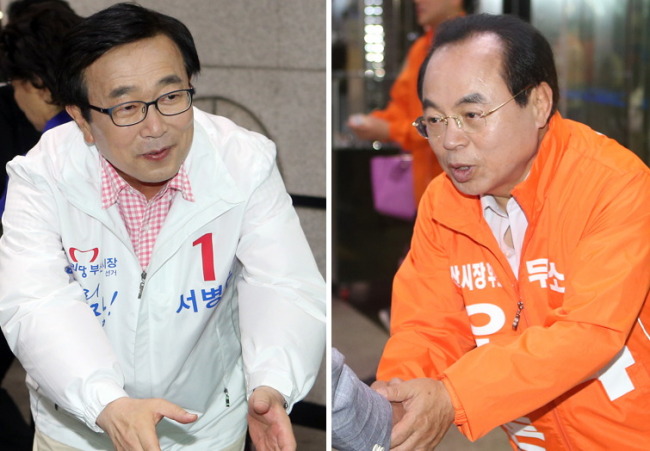This is the third installment in a series of articles on the upcoming local elections, exploring key issues and candidates in major cities. ― Ed.
A liberal independent candidate has recently drawn level with the Saenuri Party candidate for Busan mayor in opinion polls, threatening to take a position that has been dominated by the ruling party for two decades.
With the race boiling down to a duel between former four-term lawmaker Suh Byung-soo of the Saenuri Party and former Maritime Affairs Minister Oh Geo-don, the electoral result is expected to be a crucial gauge of public sentiment toward the ruling bloc in the wake of last month’s ferry disaster.
The survey, conducted by the local daily Joong-Ang Ilbo and Gallup Korea last week, showed that voter support for the rivals was even at 38 percent. A week earlier, another poll put support for Oh at 40.8 percent, 1.5 percentage points ahead of Suh.
 |
| Busan mayoral candidates Suh Byung-soo (left) of the ruling Saenuri Party and independent runner Oh Geo-don are on their campaign trails in Busan, Thursday. (Yonhap) |
Oh’s popularity has risen in part because he and Kim Young-chun of the main opposition New Politics Alliance for Democracy merged candidacy on May 16 in an effort to unite liberal votes against the ruling party.
As the gap between the two was within the margin of error, it is too early to predict the outcome of the race, analysts say. But a Saenuri loss in its longtime political stronghold could deal a serious blow to the ruling camp.
Ramping up his offensive against the formidable rival, Suh, a close confidant of President Park Geun-hye, has been underscoring the political power of the ruling party to push for a series of crucial tasks to tackle unemployment and revitalize the regional economy.
“Now is the era of Park Geun-hye. The candidate who can talk directly to the ruling party about city affairs and capitalize on the network of government officials can genuinely contribute to the advancement of Busan,” Suh said in a recent interview.
Undeterred by Suh’s rhetoric, Oh has highlighted the need to depart from the decades-old rule by the ruling conservative party and create a “new future” of Busan.
“Look at what Busan has become under one-party rule for the last two decades,” Oh told media. “Now with all our efforts, we should coalesce to create a vision to change Busan and open up a new future.”
To swing the political pendulum in their favor, the two have pledged a series of ambitious economic revitalization plans, including constructing a new airport to boost the city’s status as an international logistics hub.
Suh promised to create 200,000 new jobs by attracting future-oriented business in areas including information and communication, maritime plants and energy. He also pledged to build a new airport on Gadeok Island at an early date and refurbish Busan Port as a national transport hub.
Oh has also introduced a set of election pledges to stimulate the local economy with an emphasis on his vision to shun what it calls the “elitist” policy by the ruling force and encourage the participation of citizens in the municipal administration.
“Based on this principle to make a city where citizens’ happiness is put before anything else, we now would like to return the municipal administration to citizens in a departure from the era when minor elites dominated it,” Oh’s camp said last week.
Like Suh, Oh has prioritized tackling unemployment. He pledged to build several municipal centers for job seekers and to offer specialized job training programs in cooperation with local universities and businesses. He also promised to seek an increase in the average wage of female workers and contract-based irregular employees.
Suh and Oh have different political orientations ― the former being conservative, the latter progressive. But they have some things in common: They went to the same high school and are both sons of affluent local entrepreneurs.
Suh is the first son of Suh Seok-in, the late former chairman of Buil Passenger Vehicle Corp. who served as a municipal legislator and chief of the Haeundae District Office.
After graduating from the economics department of Sogang University, the alma mater of President Park, and obtaining a doctorate in economics from Northern Illinois University in the U.S. in the 1980s, he joined his father’s bus company.
His political life began in 2000 when he was elected to head the Haeundae District Office. In 2002, he made it to the National Assembly. Since then, he has been elected four times as a ruling party lawmaker. Suh has served as the party’s policy chief, head of the party’s think tank, the Yeouido Institute, and secretary-general of the party.
Meanwhile, Oh, a veteran bureaucrat, is the fourth son of Oh Woo-young, the founder of Daehan Steel. After passing the state public administration exam in 1973, he entered the civil service. Since then, he has served in various posts of provincial and central governments including as acting Busan mayor.
Oh established personal relations with former President Roh Moo-hyun when Busan was competing to host the summit of the Asia-Pacific Economic Cooperation in the early 2000s. In 2005, Oh served as minister of maritime affairs and fisheries. He also worked as the president of Korea Maritime and Ocean University in 2008 and the Sea Power League of Korea in 2012.
By Song Sang-ho (sshluck@heraldcorp.com)

